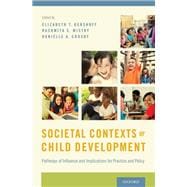In the last half century, developmental scientists have become increasingly interested in studying contexts beyond the home environment that contribute to children's growth and development, including physical contexts such as schools and neighborhoods, as well as social contexts such as poverty. During this same period, a number of social trends have significantly impacted children's daily lives, including shifts in gender roles and expectations, the emergence of an early care and education system, and the proliferation of media technology.
Societal Contexts of Child Development provides comprehensive literature reviews for six broad contextual influences on children's development that have emerged as key areas of inquiry in contemporary society - gender, child care, culture and ethnicity, poverty, schools and neighborhoods, and media. In the spirit of applied developmental science, this book considers these six contextual domains in a series of two linked chapters written by experts in the interdisciplinary field of developmental science. The first chapter in each section is organized as a review of basic research relevant to a particular context, including a discussion of prominent theoretical and methodological issues. The second chapter in each section then addresses the same context from an applied research perspective, examining and documenting how research has been, can be, or should be used to enhance the everyday lives and developmental outcomes of children and their families through interventions and/or social policies. The book concludes with a chapter specifically dedicated to making connections between research and practice and an epilogue that situates the book's chapters within the field's study of contexts. Societal Contexts of Child Development will appeal to a broad audience of scholars, students, practitioners, and policymakers from the disciplines of psychology, sociology, economics, human development, and public policy.








